When dogs bite their owners, what is the sensible next step? In this blog, you'll be able to deeply explore the reason behind biting behaviors, and what you can do to stop them… fast!
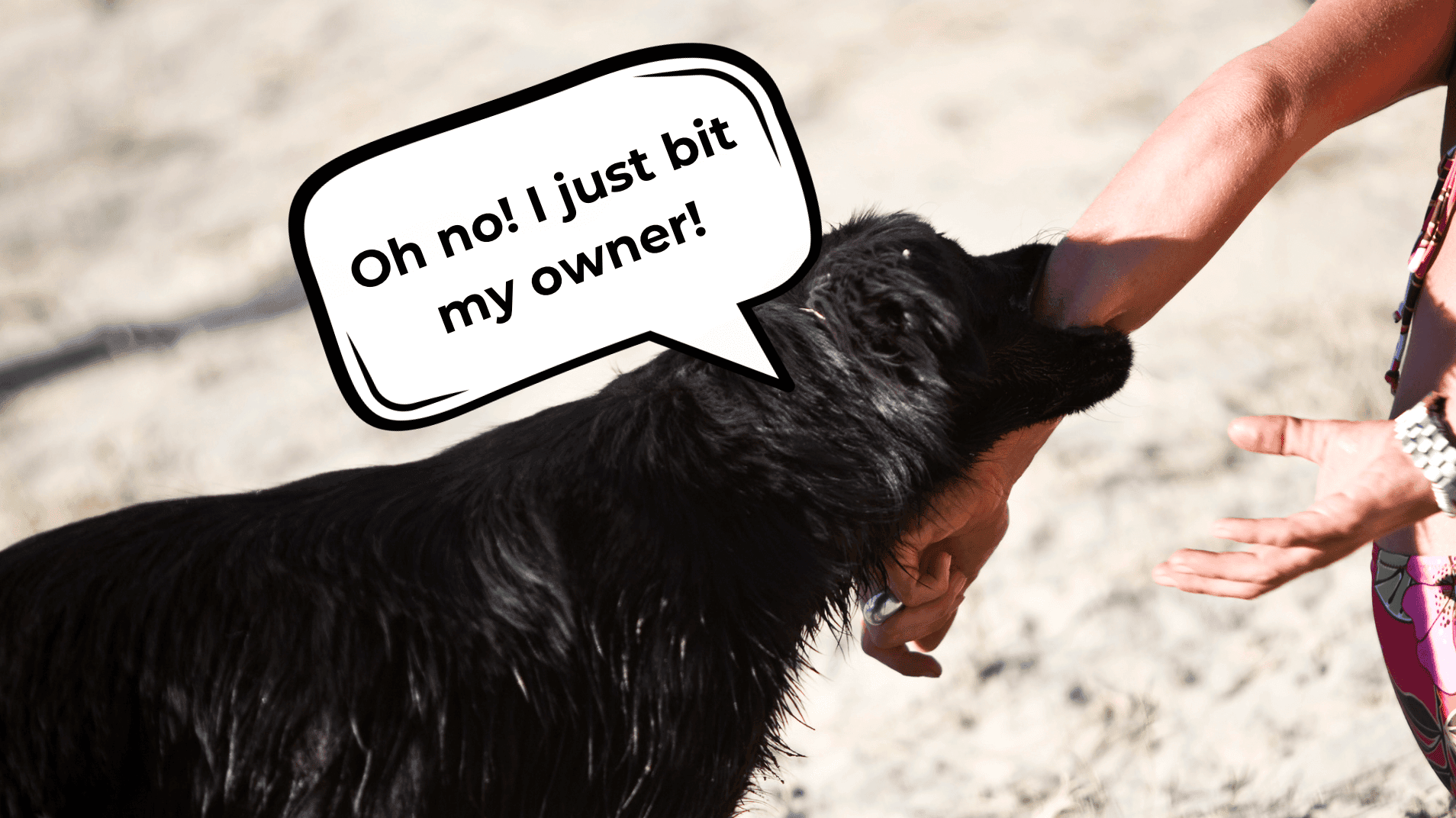
Being bitten by your dog always comes as a shock. Questions eventually follow. Is your dog's behavior already aggressive? Do they now have aggressive tendencies? Is it just play-biting? Do you need to put them down?
In my experience, a responsible pet owner won't immediately assume the worst (like, having their dog put down) but would take the time to understand their dog.
Fortunately, dealing with more than 100,000 dogs (some with obvious aggressive behavior), I know for a fact that a dog that's biting their owner can still change.
If you're a dog owner dealing with a dog with an aggressive biting issue, or if you want to know how to deal with this behavior, this blog can help you.
Let's jump in.
Key Takeaways
- Understand the Root of the Bite: Aggressive bites are often a form of communication. Pet parents need to recognize that biting rarely comes out of nowhere. By understanding dog behavior, such as their body language and triggers, you can identify the root cause of the aggression. Is your dog guarding resources like food? Are they feeling stressed or overwhelmed by a lack of personal space? Recognizing these signs is crucial for preventing future bites and creating a dog-healthy environment.
- Behavior Modification Starts with You: Proper training and behavior modification is essential for addressing aggressive bites. This includes respecting your dog's boundaries, understanding their communication signals, and providing a safe space for them to de-stress. By consistently demonstrating calm and assertive leadership, you can build trust and help your dog feel more secure, reducing their need to resort to aggression.
- Proactive Prevention is Key: Don't wait for an aggressive bite to happen. Invest in proper training, socialize your dog appropriately, and be mindful of their needs and triggers. By taking proactive steps and working with a trusted dog trainer, pet parents can create a harmonious relationship with their dogs, minimizing the likelihood of biting incidents and ensuring a safe environment for everyone.
Table of Contents
What Are The Reasons For Dogs To Bite Their Owners?
As a certified professional dog trainer, there are a couple of reasons for dogs biting their owners that has stood out to me.
I know these are not the only reasons, but these are prevalent causes for dogs to be aggressive to their owners.
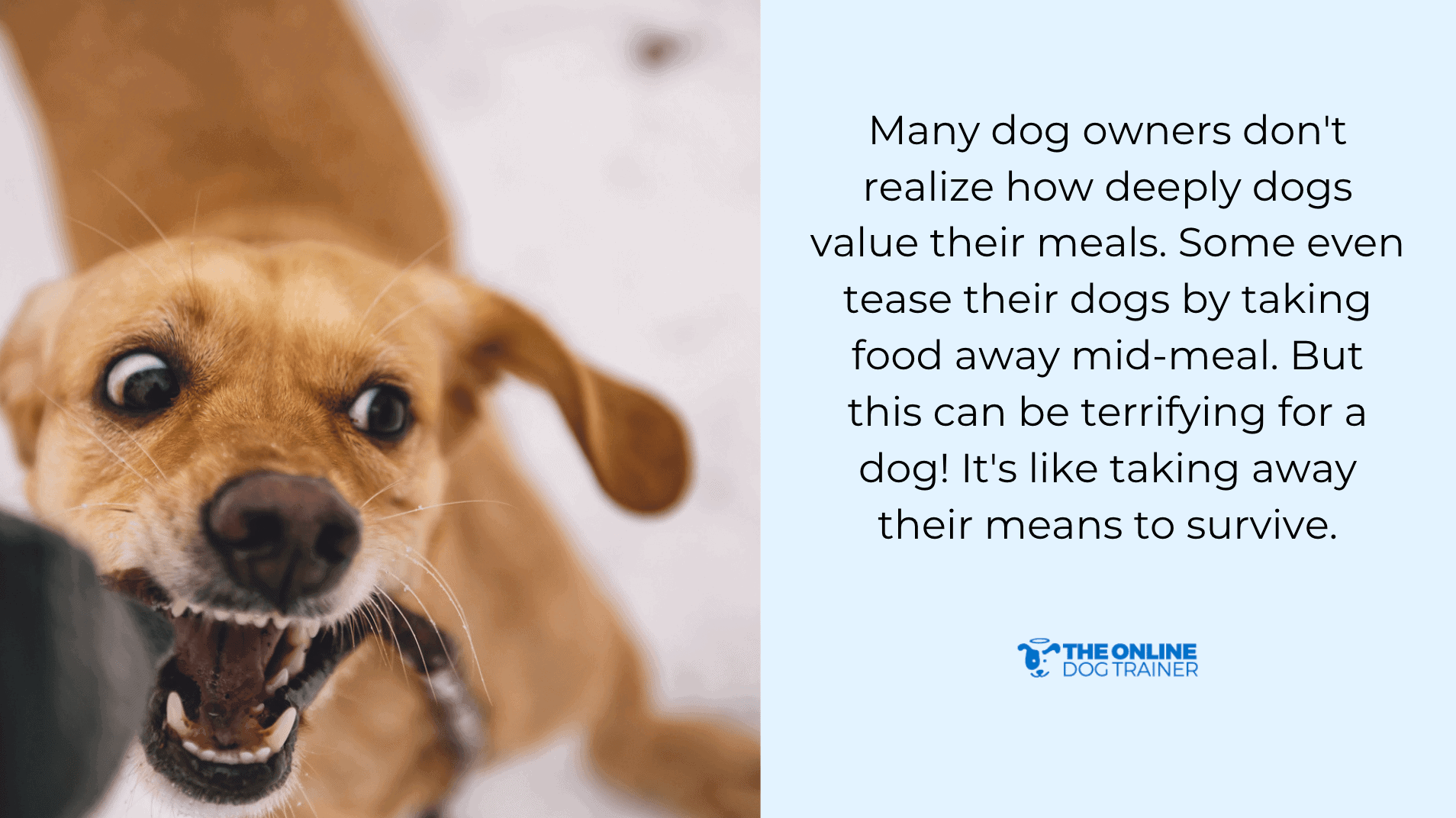
Reason #1: Not Understanding How Valuable Food Is For Dogs
Imagine if someone snatched your phone away while you were scrolling – frustrating, right? For dogs, their food is like our most prized possession. It's not just about taste, it's about survival.
Many dog owners don't realize how deeply dogs value their meals. Some even tease their dogs by taking food away mid-meal. But this can be terrifying for a dog! It's like taking away their means to survive.
Whether puppy or adult dogs, it's their natural instinct to protect their food; this can lead to panic and even bites.
The good news is, you can use this knowledge to your advantage. By respecting your dog's food and using it wisely in training, you build trust and prevent dog bites.
DOES YOUR DOG BITE? JOIN THIS WEBINARReason #2: Showing Disagreeable Behavior To Your Dog
Dogs are incredibly perceptive and pick up on our emotions and actions. What we might consider “misbehaving” – like yelling, sudden movements, or punishment – can be very frightening and confusing to a dog.
Imagine someone towering over you, shouting and waving their arms. You'd probably feel threatened and instinctively want to protect yourself. Dogs react similarly. When they feel threatened or unsafe, their natural response is often to defend themselves, which can lead to growling, snapping, or even biting.
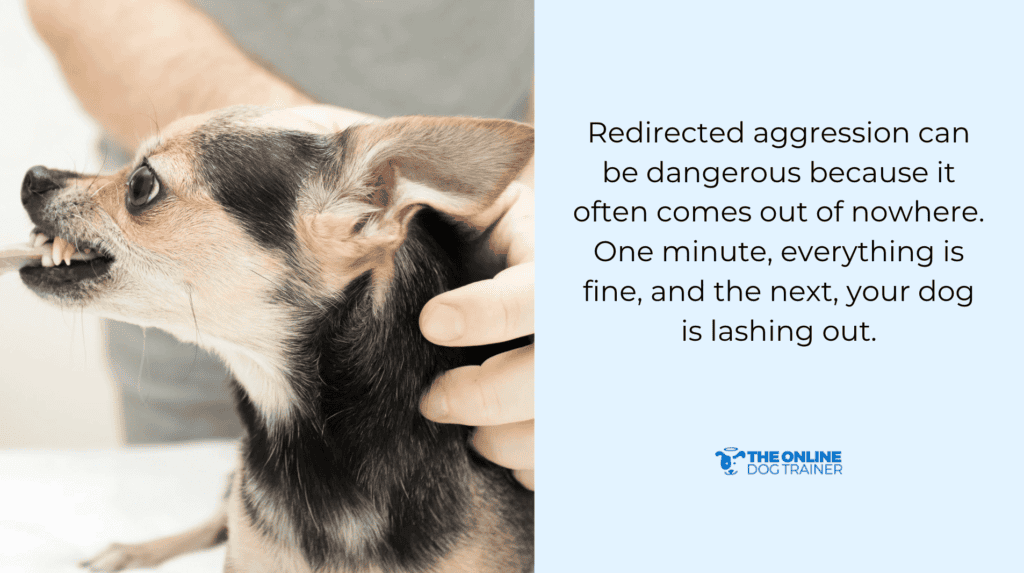
Reason #3: Deflected Aggressive Behavior
Imagine this: your dog spots another dog across the street and becomes incredibly excited, maybe even frustrated that they can't reach them. This excitement builds up like a pressure cooker, and it needs an outlet.
Unfortunately, sometimes, that outlet ends up being whoever is closest to your dog at that moment. This is called redirected aggression. It's like your dog's frustration bounces off the fence and lands on the nearest target, whether it's another dog in your home or even you.
Think of it like this: you're really angry about something at work, but you can't yell at your boss. So, you come home and end up snapping at your family instead. It's not their fault, but they become the target of your misplaced frustration.
Redirected aggression can be dangerous because it often comes out of nowhere. One minute, everything is fine, and the next, your dog is lashing out.
Reason #4: Invading Your Dog's Space
Just like us, dogs have a personal space bubble they need to feel safe. When that bubble is invaded, they can feel threatened and may resort to biting to defend themselves. Imagine someone getting in your face, staring intensely, or hugging you when you don't want to be touched – you'd likely feel uncomfortable, and dogs feel the same!
We often invade their space without realizing it: hugging them tightly, staring into their eyes, reaching over their heads, or disturbing them while they're eating or sleeping. Even crowding them in a corner can make them feel trapped and trigger a defensive reaction. By being mindful of their boundaries and giving them the space they need, we can help them feel secure and prevent unnecessary bites.
FREE WEBINAR ON DOG REACTIVITYWhat You Should Do to Prevent Dog Bite Accidents?
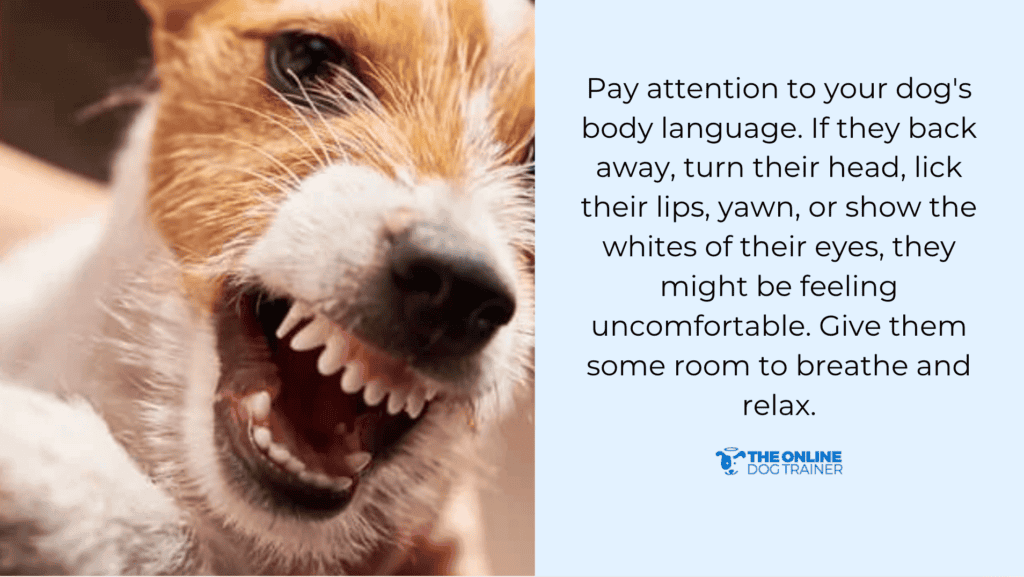
#1: Respect Your Dog's Space
Just like us, dogs need their own personal space to feel safe and comfortable. Imagine someone constantly hovering over you or getting in your face – you'd probably feel a bit stressed! Dogs feel the same way.
Pay attention to your dog's body language. If they back away, turn their head, lick their lips, yawn, or show the whites of their eyes, they might be feeling uncomfortable. Give them some room to breathe and relax. Avoid hugging them tightly or forcing interaction when they're not feeling it.
Respecting their space builds trust and helps prevent them from feeling cornered or threatened, which can lead to defensive behaviors.
#2: Understand How Your Dog Sees Their Food
To your dog, food isn't just about deliciousness; it's about survival. It's their lifeline, their security, their most prized possession. Imagine how you'd feel if someone took away your wallet or phone – that's how they feel when their food is threatened.
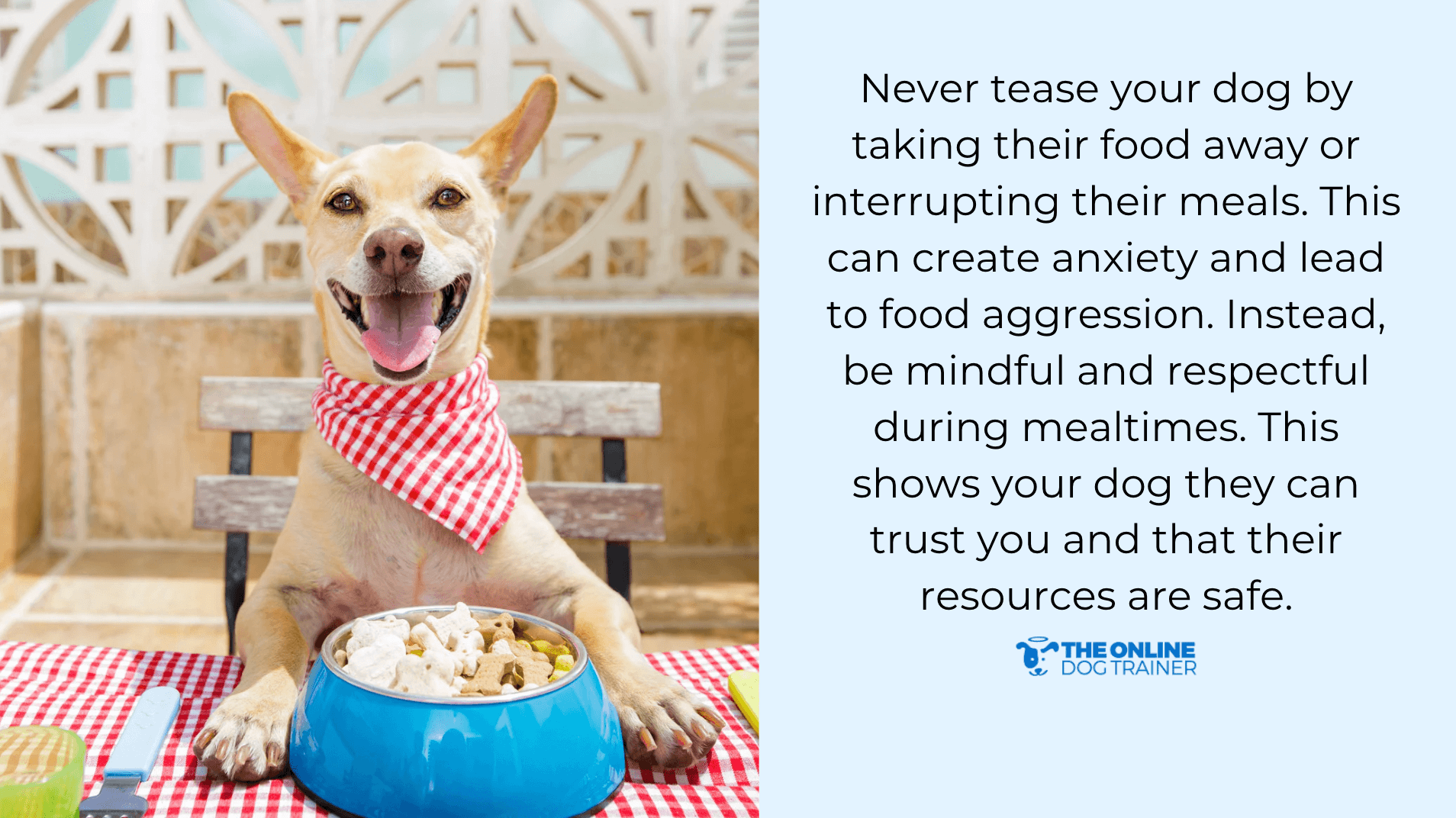
Never tease your dog by taking their food away or interrupting their meals. This can create anxiety and lead to food aggression. Instead, be mindful and respectful during mealtimes. This shows your dog they can trust you and that their resources are safe.
GET DOGGY DAN'S FIVE GOLDEN RULES FOR FREE#3: Refrain From Getting Closer To A Dog With Heightened Emotions
If a dog is already showing signs of stress, fear, or anxiety – like growling, barking, pacing, or lip licking – give them space. Approaching them can escalate the situation and increase the likelihood of a bite.
Instead, try to identify what's causing their distress and remove the trigger if possible. Speak calmly and softly, and avoid making direct eye contact, which can be perceived as a threat. If the situation doesn't improve, consult a professional dog trainer or behaviorist.
#4: Keep Kids Away From Dogs
Children, especially young ones, often don't understand dog body language and may unintentionally invade a dog's space or provoke them. Teach children to respect dogs and their boundaries.
Supervise all interactions between children and dogs. Show kids how to approach a dog gently and calmly and how to recognize signs that a dog wants to be left alone. Never leave a young child unattended with a dog, no matter how friendly the dog seems.
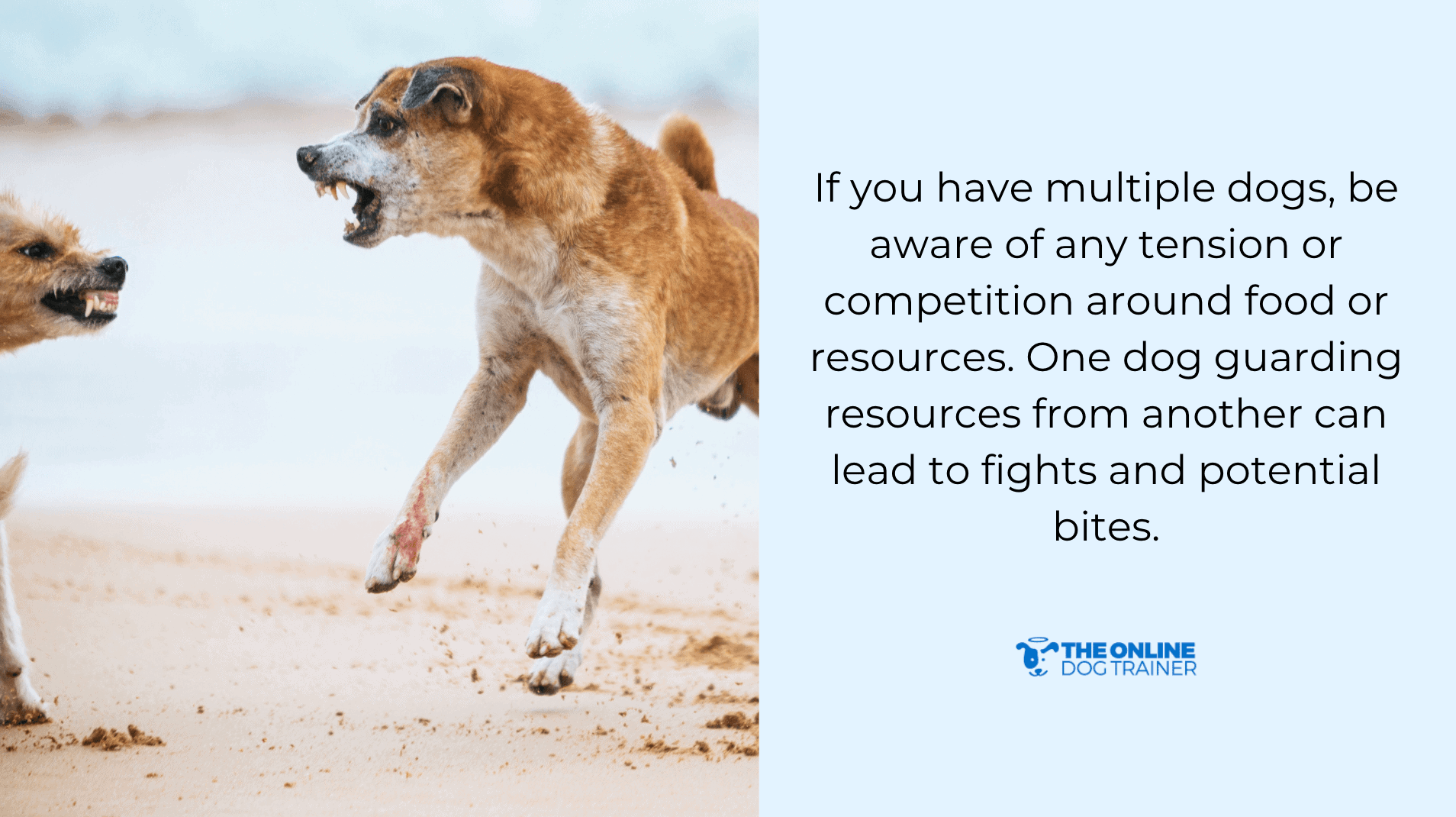
#5: Check For Existing Aggression With Other Dogs In Your Household
If you have multiple dogs, be aware of any tension or competition around food or resources. One dog guarding resources from another can lead to fights and potential bites.
Feed your dogs in separate locations to minimize competition. Provide each dog with their own toys and beds. If you notice any signs of aggression, consult a professional for guidance on how to manage the situation and ensure the safety of all your dogs.
#6: Have A Safe Space For Your Dog To Decompress
Everyone needs a place to unwind and recharge, and dogs are no different. Provide your dog with a quiet, comfortable den or safe space where they can retreat when they feel overwhelmed or stressed.
This could be a crate, a dog bed in a quiet corner, or even a specific room. Make sure the space is associated with positive experiences and that your dog has access to it whenever they need it.
#7: Work With A Trusted Dog Trainer
A qualified dog trainer can help you understand your dog's behavior and provide personalized guidance on how to prevent and manage aggression. They can teach you effective training techniques and help you build a strong, positive relationship with your dog.
Look for a trainer who uses force-free, positive reinforcement methods and who has experience working with different breeds and temperaments. Don't hesitate to ask for references or certifications.
GET THE DOG CALMING CODE FOR FREEThe Number 1 Solution to A Dog's Aggression: Being the Leader
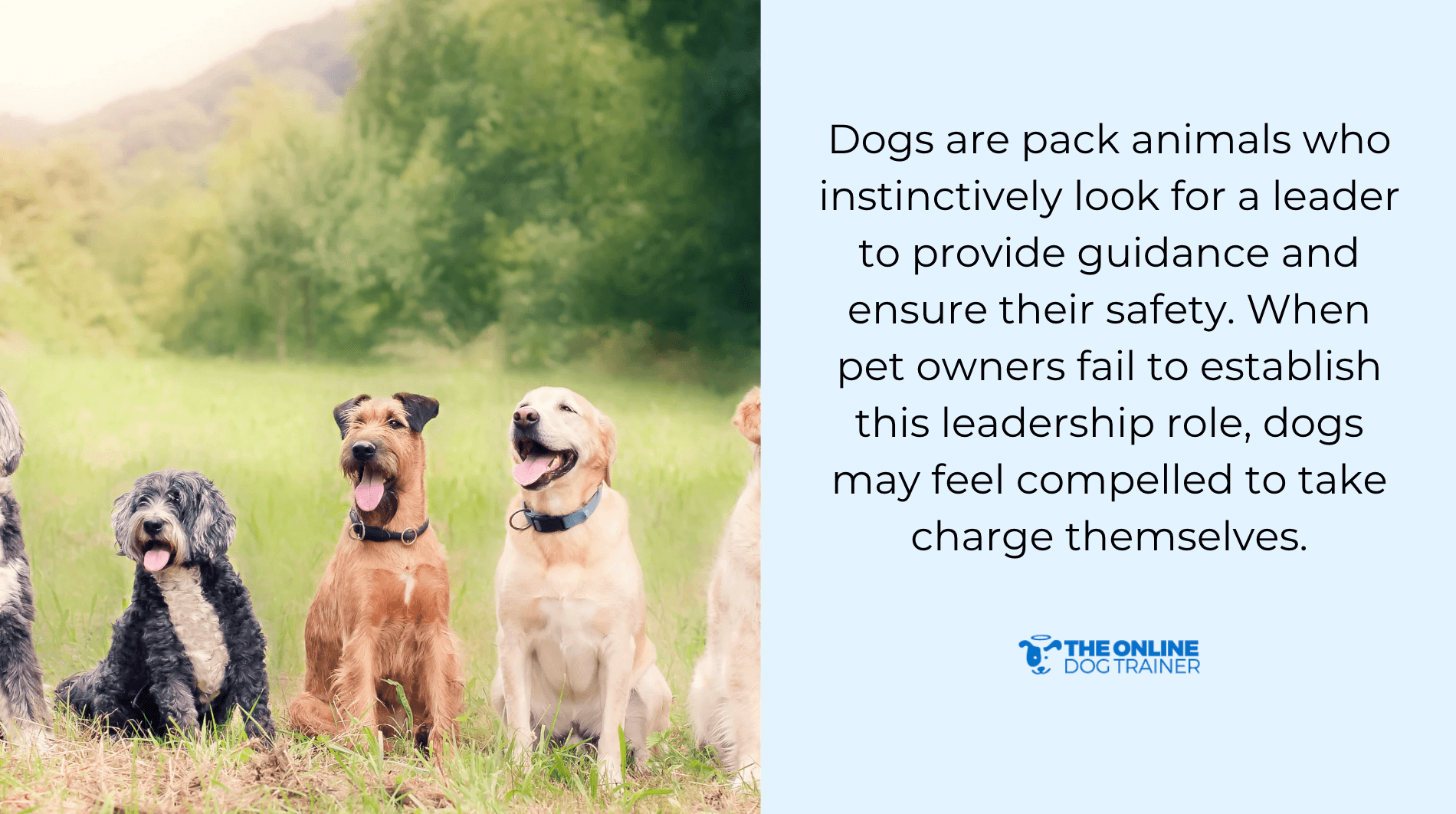
Dogs are pack animals who instinctively look for a leader to provide guidance and ensure their safety. When pet owners fail to establish this leadership role, dogs may feel compelled to take charge themselves. This can manifest in unwanted behaviors, including biting, as they try to assert control and establish their place in the “pack.”
A dog that thinks they're in charge is always on the edge. They're always anxious and on the lookout for dangers and threats (which can include you!).
By becoming a calm and assertive leader, owners fulfill the dog's need for structure and security. Doggy Dan advocates for achieving this through clear communication, consistent boundaries, and benevolent guidance, rather than intimidation or force. This approach builds trust and confidence in the dog, reducing their anxiety and need to resort to aggression. Ultimately, establishing leadership creates a more balanced and harmonious relationship, minimizing the likelihood of biting incidents.
Doggy Dan Podcast 008: When Dogs Bite Their Owners (can we add a widget here to the podcast?)
That's what this podcast is all about. By the end you will have a completely different understanding of what is going on. Your dog's behavior will make so much more sense to you and you'll see that they're not being completely random. They are simply following the rules of being a dog.
GET THE FIVE GOLDEN RULES OF DOG LEADERSHIP FOR FREEWinning is easy
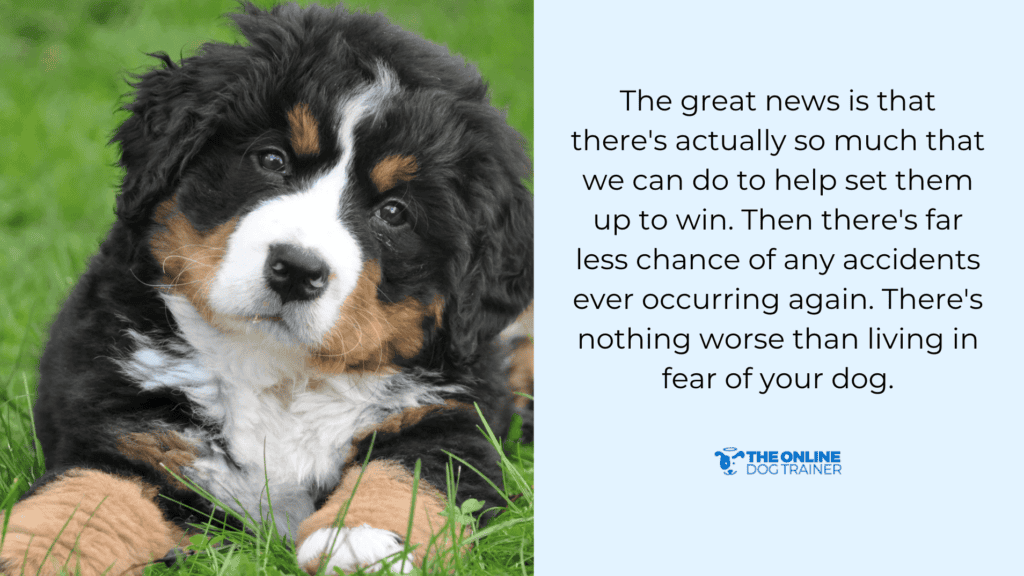
The great news is that there's actually so much that we can do to help set them up to win. Then there's far less chance of any accidents ever occurring again. There's nothing worse than living in fear of your dog. Worried that they may bite you or a family member.
If you have young children and a dog then understanding what is going on is crucial if you are wanting to avoid the unthinkable from happening. Sadly when dogs do bite, everyone suffers. The person or child who was bitten suffers pain, your dogs life often takes a turn for the worse without them really understanding why and the relationship that you have with your dog takes a dive…
The crazy thing is that it does not have to be this way. In fact, dogs biting owners is one of the easiest problems to solve, or even better, avoid!
JOIN MY FREE DOG AGGRESSION WEBINARA summary of what we cover in the podcast
1. Firstly, we look at the most common reasons that dogs bite owners:
- Food, and the danger of not understanding it
- Unhappy with your behavior. When you misbehave in your dog's eyes!
- Deflected aggression. Why getting involved when your dog is stressed can result in you getting bitten
- Space invading. What it means when you invade your dog's space
2. Secondly we take a look at how dogs behave in the wild regarding these topics as it helps us understand how they naturally behave.
3. Thirdly, I explain why we need to avoid the lethal combination of mixing children, food, and dogs together and why it so often results in accidents.
4. Fourthly we go through one life saving rule. It's very simple and if it's put into place your chances of not being bitten increase dramatically. I call this Part One of the solution.
5. And then lastly I explain how the real solution lies in understanding how to make your dog more tolerant. As with people, the more relaxed, calm and tolerant they are the less chance there is of them snapping.
So there you go, get stuck into it and enjoy the podcast.
For anyone who needs help with a biting dog…
Please check out this post ASAP: How I Trained Over 100,000 Dogs! Or, if you have a puppy, put an end to the issue before it becomes a bigger problem with my Puppy Coach training program!
If you enjoyed this session…
Please share it! All you have to do is click one of the social sharing buttons on the left. Thank you so much for your support!
Oh, and don't forget to leave a rating or review in iTunes! It just takes a second, and you can help the show increase its rankings on iTunes with this simple gesture.
Have a great day and as always, love your dog ☺
JOIN MY FREE DOG AGGRESSION CLASS
~Doggy Dan 🙂


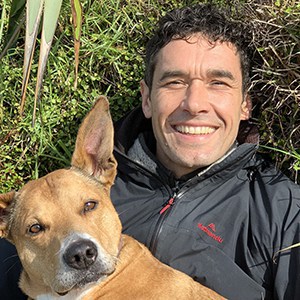

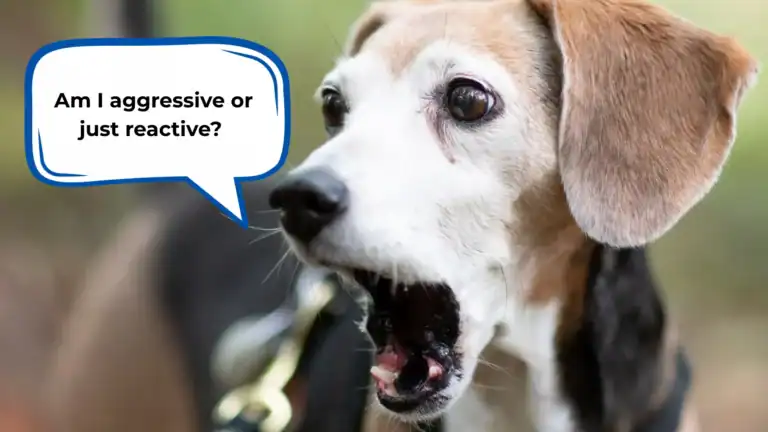
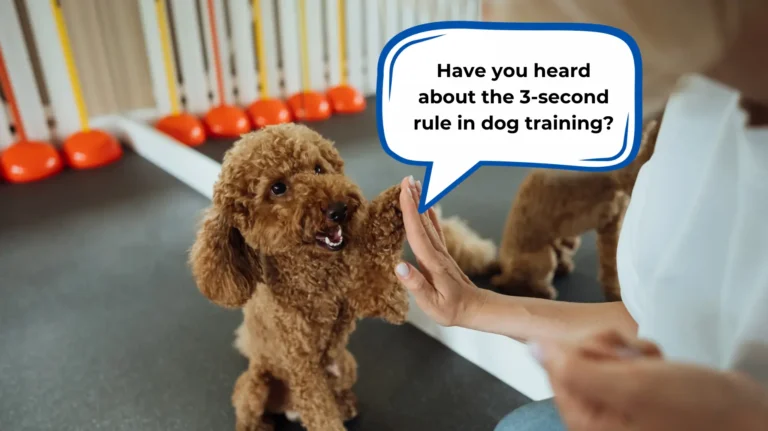
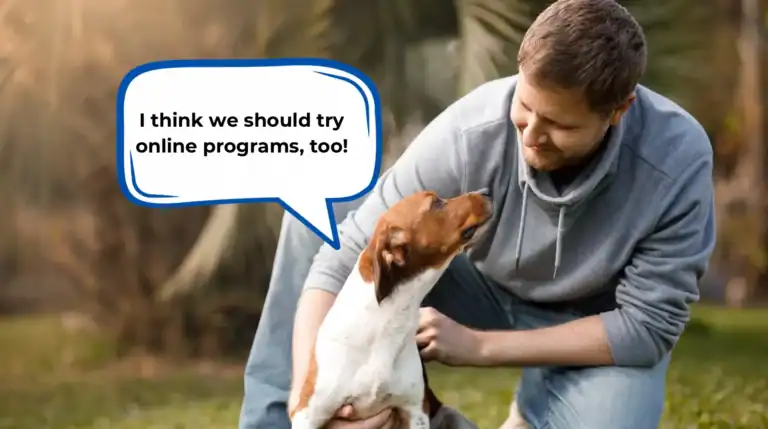
40 Responses
Hello Dan 🙂
I have a 2 and a half year old Maltipoo called Angel who is very playful and loving most of the time, we rescued her at 10 months old.
We soon noticed she started to resource guard around a year ago. Unlike most dogs, she resource guards ANYTHING! Mugs, sofas, bedding, people, clothing, laptops, underwear, pens, anything she can get her mouth on that she thinks she’s not allowed, she even chooses to guard treats that we give her to eat in a ‘’trade out’’
We remove ourselves from the room when she does this but she will follow us with the item to sit with us, then if we move or even look in her direction she will growl and show teeth.
This is hard for us to manage as we don’t realise when she is guarding. She has bite me and my partner twice now (cut the skin) and that was because he tried to move her into the kitchen to separate her, or if we try to move her anywhere she will try to bite us.
We are at a loss as we want to start a family soon and understand that is not possible with her as she is.
All the best
Wallis
Apologies for the novel
The most important step in correcting this behaviour is to understand WHY your dog is behaving this way. Very often this is to do with them thinking they are more important than they actually are – hence (in the dog way) “telling off” the human who tries to correct them. When you are able to communicate to them that they can switch off and relax because the humans are in charge, everything changes and becomes a lot easier.
Here is a link to a blog post that explains more about dog aggression:
http://theonlinedogtrainer.com/the-ultimate-guide-to-dealing-with-dangerous-dog-aggression-issues/
… and here’s one about dogs biting their owners : http://theonlinedogtrainer.com/when-dogs-bite-their-owners/
You would also benefit from one of my programs. I’d recommend The Complete Pack http://www.theonlinedogtrainer.com
All the best, Dan
Thank you Dan for this podcast. My 8 month old Silky Terrier has had guarding issues in the past which we are currently working on but he has bitten me when he’s sitting on chair next to me and I try grooming him. All his issues I believe are tied into INVADING HIS SPACE. Last week I needed to pick him up from the groomer because he was barking and howling and wiggling so much that she couldn’t groom him. I need to be able to groom him as he is matting up terribly. I have the 5 rules in place but have become lax in the invading my space rule and allowed him to jump on chair next to me and he falls asleep there. He also runs up to me and mouths me or bites clothes to get my attention and I need to walk away from him when he does that. So thank you for the reminders!
Hi Heidi….I would definitely recommend tightening up on the space invading, it can have a BIG impact on a dog’s behaviour when interacted with. If grooming is an issue then I also recommend you doing some desensitisation work around this scenario. Have some high value treats handy, call your dog to you & give him a couple of treats as you brush him once or twice….give him another treat and then allow him to move away. Try to be proactive with this practice rather than try to do it when you actually need to groom him, that way he will have had plenty of time to learn new behaviours around grooming. If he starts to protest then allow him to move away, the aim is to keep these practice sessions as positive as you can. Hope that helps! All the Best, Doggy Dan
We have a 4 year old adopted dog. He has been with us for a month. He has been nothing but sweet and happy.
Our 16 year old son gave him a wash down and was petting him. He seemed very happy , and out of no where he but my son in 2-3 rapid bites in the face. He got him near his eye and ear.
We are afraid of not being able to keep him… this was completely out of nowhere and unprovoked
It was raining and thundering… but we were all sitting with him and he seemed happy.
Hi James,
Was this the first time your dog has been bathed? This can be an unsettling time for dogs and some hide their stress better than others….until it all becomes a bit much. The most important thing is to take things slowly and keep a close eye on the dog’s body language as some can be really subtle about communicating their discomfort. Stiff body language, avoiding eye contact, lip licking/yawning and ‘freezing’ can all be signs of a dog coping but not really feeling all that comfortable. If you then add thunder to the scenario then it may just have been all too much for your dog. If future baths are given try to keep things really calm, short and end things if your dog seems uncomfortable. Doggy Dan
Hi Doggy Dan, my 10 month old Golden Retreiver bites at my hands when he is afraid of something, be it a car driving by the house, a squirrel in the yard or maybe a neighbor dog barking. I try to stand in between him and the object with my back to him and tell him that we don’t need to worry about this, and walk away. Sometimes this works, and sometimes he jumps at me and grabs at my hands before I can get there. I started some of this training about 3 weeks ago after reading a book by Jan Fennel, and it is slow progress, I have now added the additional part of trying to ignore him when he comes up and demands attention. Any advice?
Thanks, Debra Neff
Hi Debra! Dogs can become a little freaked out by things going on around them on a walk…..and it may even by normal, everyday things! It’s important to remember that dogs don’t really understand our world and so anything can unsettle them. The best piece of advice I can give you is to allow your dog some space if he is becoming unsettled or reacting….in other words move him away if you can. Try and remain calm yourself as too much added fuss or excitement can be really counterproductive. Once he is calm you can then continue on with your walk. My website TheOnlineDogTrainer.com does deal with behavioural issues on the walk…maybe take a quick look…its a $1USD trial for 3 days…all the best Doggy Dan
Hi Doggy Dan,
Our 8 month old Schnoodle, Molly, loves to lick my nose, ears, arms, fingers, etc. We call these kisses . She even licks the Vet’s nose. He loves it and calls himself “uncle Pat” to her. Is this “mouthing” and should we discourage her from doing this? She has never bitten or nipped but sometimes she adds teeth to her mouthing and I immediately put her in time out. This seems to stop that behavior. Should we discourage all of the mouthing too?
Hi Dan,
Thanks as always for sharing your enlightened perspectives. The podcast was filled with information.
The one area I wanted you to go into more depth, you mentioned it briefly, was when you interrupt your dog when they are fully engaged in what they perceive it important stuff i.e. when an intruder dog is running up and down the fence line.
To be brief, I rescued a male (neutered) APBT, 62 pounds, 2-1/2 years old. He was a very dominant dog to my other dog initially, and wanted to claim me and my wife and all of that. I followed all five rules from the get go and he has become relaxed into a very pleasant companion, walks with a loose leash, comes when called etc. Not bad for two months. The other day however, without warning, he attacked the lawn mower, biting it. I started it up to show him it was a machine, and he went berserk on it. I shut it down but he was not to be denied. He bit the leaf bag and dragged the whole machine backwards about 50 feet. When I came out of my state of shock and caught up with him, he would not leave it alone. I stepped between him and it and he started backing aggressively at me for a good long time. I decided he needed me to be calm, but I thought it was possible he might bite me, he was so in the red zone. I went into the house and got a leash and tennis racket for control and protection if necessary, and we did a working session where I would start the mower and he would be corrected when he tried to attack it. After about 15 minutes of doing this, his tolerance of the machine was much better, and so I believe he and I handled it together as a trust building session. However, I am still troubled by the incident. How should I have handled the aggressive barking at me part, when i had no leash or racket. If I’d had to, I feel very confident I could have alpha rolled him, and physically controlled him, but I might have gotten bitten, and I don’t believe his trust with me would have benefitted from that…
I don’t know why he doesn’t like the mower. He doesn’t like the weedwacker either. Maybe in his previous life the gardener was mean to him? There is no way for me to know. What are your thoughts here?
Best,
Duffy
Hi Duffy,
Believe it or not this is actually a really common reaction from dogs, in varying degrees of intensity, when they encounter something they don’t understand or they are encountering for the first time. Man-made objects are completely alien to our dogs and it can lead them to feel fearful and anxious about those items potentially being a danger to their family.
I like to think ahead and be proactive whenever I’m exposing a dog to something new, so that I can ease their mind and create a more positive association. In your scenario I might have brought the lawnmower out and just left it in the middle of the lawn (not switched on) for my dog to sniff and investigate. Next step would be for me to push the mower around but not switch it on until I felt my dogs was more comfortable with me doing so. When it came time for the mower to be started then I would have had my dog on-leash, being held by myself or another person, or safely out of the way so that they could observe the mower from a safe distance. If they reacted I would have either moved them further away or tried a Calm Freeze but if they totally freaked out then I would have stopped the mower or taken them indoors out of the way.
Obviously if you actually need to mow the lawns then going through this process can be time-consuming & frustrating, which is why I advocate for owners to practice these scenarios in advance and regularly.
Just to answer your question about what you should have done after his reaction. I would have switched the mower off, left it sitting there and waited patiently for your dog to calm down. Trying to placate a dog who is really anxious and reacting quite aggressively is not the best approach if you have other options open to you…..such as going back inside or putting the mower away until he is calm again. You would then set about establishing a plan for re-introducing him to the mower in a more positive way (see above). We do actually cover this topic on my website TheOnlineDogTrainer.com …maybe take a quick look…its a $1USD trial for 3 days, unless you are already a member…all the best Doggy Dan
I recently got bit by my friends dog . It was the first introduction to him and I believe that I may have rushed the situation because I walked to the room with cage and my boyfriend and owner stood close by . My boyfriend was petting the dog and when he saw me walk in he turned to look at me, left my boyfriend came toward me and I out stretched my hand and got bit quick didn’t have time to move. He wasn’t ready for me to get that close. No big deal it bled bad but nothing I haven’t been through before. Like you said in your mind you think he maybe scared of to many people or it’s his space but I saw it in his eyes but not quick enough. He is known to be aggressive and is caged alot . I’m not afraid of animals ,dogs are my best friend and I have a Chi-healler and a 100 lbs. German Rotwyler trained many great dogs. My chi-healler is a noise machine and barks at everything and people she screams for their attention I think and growls when they ignore her. How do I make her a pleasant dog in public? I can’t keep her quiet, oh if I tell her to be quiet she is still grumbling under her breath and will try and have the last word. She hates her nails done but a very good dog overall. She’s just got a mouth for sure.
Hi Rachel,
Some dogs just need a little time to realise that the strangers or visitors n their home are not a threat. Of course you know with that your intentions are good but dog’s really don’t know this with any certainty and it can lead to them feeling the need to defend their family. A couple of things I always do when meeting a new dog…in fact I do these things anytime I meet a dog, including ones I do know. First, I delay greeting the dog (no eye contact, touching or speaking to) until I feel they are calm and are not trying to initiate an interaction with me. Even if they come up to sniff me I don’t respond, as they are likely just investigating me and still may not be comfortable with my presence. Second, when the dog is calm and has left me alone for 5 or so minutes then I will call the dog to me to say ‘hi’. This gives the dog a choice as to whether or not they want to or feel comfortable interacting with me. If they refuse to come when I call them then I leave them be, but if they come then I give them a big old fuss. I also avoid approaching a dog to give affection or attention because they may not like me invading their personal space…..I don’t like stranger doing that to me either!
All of the above advice is a great way to help put a dog at ease with your presence! Best, Doggy Dan
Thank you so much Doggy Dan for the great info. Starting to apply it right now & I’ll keep u updated. Thank you! Kristie
Glad you found my Blog helpful Kristie! Doggy Dan
My pitbull bites people’s feet when they try to go out the door.and he bites hard,puts holes in shoes.he don’t bite me,he bites my husband,my son( he’s 30 yrs old).
Hi Lawanda….I’ve actually seen this type of behaviour quite a lot and it’s motivated by your dog not wanting his family to leave the house so he can keep them safe from the outside world! Of course, you and I know that you and your family will be safe but your dog doesn’t necessarily know that, and if he feels responsible for them then he will do what he feels he needs to do to keep them safe. The quickest solution would be to place your dog on-leash before guests or family members leave the house so that you have greater control over his behaviour. You can even ask your family to practice leaving the house so that you can respond to your dog’s behaviour calmly to show him there is no need for him to behave that way. My website TheOnlineDogTrainer.com will help with some strategies as well as address the real cause of this behaviour…maybe take a quick look…its a $1 trial for 3 days…all the best Doggy Dan
My dog gets very aggresive with my fiance Who has been around his whole life. If my bf tries to kiss me goodbye in the morning my dog will bite him. Why??
Hi Heather, there is actually a really fascinating reason why your dog may be getting a little upset when your fiance shows you signs of affection. Essentially your dog is trying to prevent you from breeding….strange I know….but in canine packs generally only the Alpha male and female are permitted to breed to ensure that only the best genetics continue. When lower ranking members of the pack look like they are getting a bit too amorous then the Alphas will intervene to prevent any unwanted litters! So you and your fiance have your very own chaperone looking out for you….whether you need it or not! Best, Doggy Dan
Very interesting read. My dog has always been very jealous with the treat lady and other dogs as well as other people. He’s perfectly ok when he sees another dogs or neighbors while on his walk but once the dogs or other people get close to the treat lady he attacks. One day i stopped at the treat lady’s house to talk to her and my dog attacked me ferociously biting me multiple times which he’s never done before. Luckily it was me and not my wife or else I would have had to call fire rescue and she would have sustained serious injuries. What do you think is happening to the dog in this situation? Have you heard this happening before?
Hi Max,
Some dogs can become quite protective and possessive, even a little demanding, around food. If your dog knows that he usually gets a treat from this lady then he will be more likely to think he also needs to protect that treat from any approaching dogs or even people. If the treat is taking a little longer to be dispensed by the lady then he may also then become frustrated. I would actually advise you to break the cycle a little here and ask the lady to no longer give your dog a treat. It will be hard for you both, and her as well, but if it is causing an adverse reaction then it is for the greater good.
There are a few other factors that could be contributing to your dog’s behaviour and so you may like to have a look at my website TheOnlineDogTrainer.com…its a $1 trial for 3 days…all the best Doggy Dan
We have two Welsh Terriers. One female and one male. They are almost 2 1/2 years old. The female dog has bitten my husband several times. Bad bites that sent him to ER. She has bitten me several times on my legs, almost in a playful mood but it makes bruises on my skin.
We have never been mean to her or hit her when she bites.
She guards her food and other items that she knows she isn’t suppose to have. We usually leave the items and get them when she is outside. She will bite us if we try to take them away.
We don’t know how to manage her. We live in a small town where there is no place to take her for help. The vet has put her on medication. It has helped some but she is still trying to bite us.
We need some help please.
Hi Mary,
Dogs who bite their owners, or other people, is certainly a behaviour that we see often and it is something you can overcome with the right information and approach. It’s really important to be aware of the factors involved when your dogs reacts this way because it enables you to understand why she has reacted this way. Dogs have a language and way of communicating that is can be a little confusing and so our membership website aims to inform owners about what is actually going on and how to overcome behavioural issues. One thing to be aware of is if you want to give your dog a pat/fuss then you should call her to you rather than approaching her to give affection. Also, if she has an item in her possession then avoid trying to remove it from her as it can lead to confrontation. If you do need to remove that item then offer her a trade-off with a treat or toy. My website TheOnlineDogTrainer.com shows you very clearly how to overcome this kind of behaviour…maybe take a quick look…its a $1 trial for 3 days…all the best Doggy Dan
Thank you for the podcast, but could you post a transcript? Sometimes due to your accent [Is it Australian? I noticed you say “mate” vs. friend, pal, or colleague] I cannot follow every word, including when watching your videos. Thanks for understanding! 😀
Hi Nicole, I am looking into getting transcripts made. For now I shall start speaking a bit clearer however I shall certainly see if I can do it. Thanks for your support and your kind way of asking me to speak a bit clearer! Cheers Dan
Thanks for the quick reply to my transcript question. Did you have any suggestions (i.e. a holistic veterinarian) for getting my “alpha” dog’s “primarily” fear-based aggression to cease? Sorry, but my anguish has not been alleviated by reading or watching your work, and as my 1st post says, I’m trying for 2 yrs not to dwell on wishing I had the nerve to give up on my fur-baby. I’m (heart)sick of the stress of crying over it [No, he does not come to me to make ME feel better, as that is not how his mind works for ANY human he meets or knows. It’s him 1st, the world 2nd].
I love my boy, and have had him as a indirect rescue for 2 yrs. I have done about as much, or more, crying over him as laughing WITH him. I have wrestled with this horrible (to my heart) decision for 2 yrs., and just don’t know what to do about giving up on him [We have not seen a behaviorist yet, so I’m still trying to help him]. I don’t know how to bear a dog I don’t want to muzzle, even in private. Sure, in the beginning I had a lot to learn, and things improved, but we’ve tried trainers, and even a Certified Applied Animal Behaviorist told me on the phone, “That dog needs to be on drugs! You don’t need a trainer, you need a behaviorist!”
Good things: He loves people, unless they scare him; give him a hard, fixed stare that challenges him; try to dremel his nails; try to move, groom, or towel-dry him off after a rain; etc. So, the possibility of getting bitten is ALWAYS there, every single day. He also has a very high prey drive (SKINNY, small dogs; ducks; bunnies; birds; etc).
He is good with adults AND kids, so I can take him out in public but always need to be vigilant about watching his body language, and keeping him by my side. Enjoys being outside, and even smiles in the rain. Likes the dog park, bike riding, and going in and out of stores where dogs are allowed such as Home Depot and Lowe’s, etc. He is used to being walked for a minimum of 4 Strolls a day, for a MINIMUM of 30 minutes, 7-days a week, in ALL weather. Dislikes: Cats, grooming, most dogs on most days etc.
I am this lovely boy’s 3rd owner at minimum (last one got him from the streets) and we are approaching our 2nd “anni-FUR-sary.”
P.S. Oh, and he DEFINITELY likes hugs, which was all I was looking for when originally searching for a (husky) dog. <3
Hi Dan,
I am a long time dog owner and just got bit by one of my dogs. Below is what happensed.
We were at a sand bar and our dogs have their own floats, they love boating and hanging out with us, I had no idea someone was flying a drown with a camera behind me. The dog was facing the direction it came from and just chomped down on my arm and then went about trying to get it. It was so quick it took me a minute before I realized she bit me, No aggression just chomp and done.
We want to continue to take her with us but am unsure how to avoid this other than leaving her home,
Any advice is greatly appreciated.
Thank you.
Heidi
Hi there Heidi, I must be honest…I am not sure what a Sand Bar is ! I have a feeling it is like a dog friendly beach? Thats my guess anyway!! I dont think that it matters too much, the answer I suggest will be the same no matter. It sounds like your dog became stressed very quickly and lashed out. Possibly they thought that you had caused the thing that stressed them and they were telling you off or it could have just been that they were simply lashing out. Either way it is tricky to “train” this out of them however it is fairly simple to make your dog more relaxed, less reactive and far more tolerant of strange noises, things, experiences etc. The answer is to become the pack leader and then this will happen naturally. You can achieve this through my video training site http://theonlinedogtrainer.com which now offers you a 3 day FREE trial. Take a look and enjoy the site. All the best, Doggy Dan
This is a awesome post.I have taken advantage of watching some of your training videos.All the best on your leadership skills
Thanks heaps…yes leadership is something that I find you have to work on every day! Each day throws up new training 🙂
Have a great day, Doggy Dan
Excellent post Dan, I often find that a dog may bite their owners but never anyone else, obviously they know they can get away with that but have the intelligence to know they cant do it with anyone else, therefore some owners are happy enough with this situation, do you feel this is dangerous territory as the dog may at some stage cross that line or do you think that the dog most lightly will stick to what they know they can get away with?
Thanks, James
Hi James,
I would be very wary of a dog who thinks that they are allowed to bite their owners. (Even “nip” or “mouth”) They are far more likely to think it is acceptable behavior when they don’t like something and end up doing it to a stranger. The good news is that it is not a difficult issue to put a stop to. I would say it is simply a case of understanding dog psychology and why your dog is doing it (Pack Leader will discipline the other dogs and wolves in the wild) Become the pack leader, follow a few rules and it will stop 🙂 I would sign up immediately to my dog training video website http://theonlinedogtrainer.com I think you will find it is the best thing that you do in terms of helping your dog and understanding them more. Enjoy and all the best, Doggy Dan
Hi Dan, I have taken advantage of watching some of your training videos,as well as listening to your pod casts, I like the way you think about dog training, thanks for sharing
Hi, and thanks for the great post, I agree that when you train your dogs you should always set them up for success. I find that when you take the time to understand what you need to do, you will find trusting them much easier, because with understanding comes control,
Yes, I have found that the two main reasons that dogs don’t do as we ask are…
1. They do not respect us or see us as the pack leaders who should be dishing out the orders!
2. They do not understand what we are asking them for…
I agree with you, with understanding comes control, in the form of very gentle self control and being able to guide your dog rather than forcing…Glad that you enjoy the posts 🙂 Dan
Hey Dan,
I greatly appreciate the insights you share about dog training. If you have any thoughts on the following please let me know how you think I can best approach/remedy this behavioral issue with my dog:
I have two dogs. One is almost 4 years old and a super mutt. I adopted him when he was ~10 weeks old and for the first ~2 1/2 years he was exclusively excited to interact with people, strangers and people he’s familiar with. In the past 1 1/2 years though, on three occasions he has nipped at three strangers in the back of their calves and each time it was entirely unprovoked. I can’t easily recognize when this behavior is about to occur and after it’s happened I scold him, but it’s usually more than 15 seconds after the actual incident. I think it my be a herding activity.
Two of the three incidents happened in my front yard, which is shared with several neighbors. The other was inside in a cabin. All three times though he nipped people he didn’t know.
If you have any thoughts on how to approach this I would love to hear your feedback. Thanks in advance.
Best,
Daniel
Hi Daniel, the behavior almost certainly sounds like your dog is protecting the property (no suprises there) The solution I would suggest is this.
1. Find a place, website or trainer who can take you through all the stages of becoming the pack leader. In my experience this is where things will be a little bit amiss.
2. Then learn about how to set your dog up to win, avoid any more bites etc. Learn about how to control the enviroment for the mean time, before you are able to let him out the front on his own.
3. Understand what you need to be doing when visitors come around. What they should be doing etc.
All of the above is covered off inside my video website… http://theonlinedogtrainer.com – check it out and thank me later 🙂 Doggy Dan
Brilliant! Thank you for everything we have learned from your great advice and teachings. Raven is almost 2 (GSD) and tests her place in the pack quite often. Biting is not a problem as much as mouthing if she gets upset with me. After listening to your podcast, I will be working more on MY leadership skills! My arm is soaking by the end of the day 🙂
Thank you again.
Thanks Marlena, glad you are enjoying the podcasts…I would suggest a swift and very calm timeout if Raven mouths you…
All the best on your leadership skills 🙂 Doggy Dan